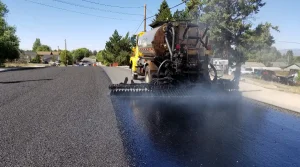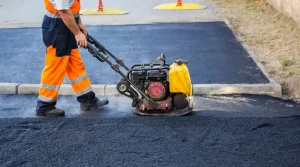Winter can be harsh on asphalt, but proactive maintenance can help extend its lifespan and keep it looking great. Follow these essential strategies to protect your asphalt and minimize costly repairs.
Key Takeaway:
- Maintaining asphalt during winter is crucial to prevent cracks, potholes, and long-term damage caused by freezing temperatures and de-icing agents.
- Essential steps include sealcoating before winter, promptly sealing cracks, using de-icers cautiously, and addressing issues as soon as they arise.
- Regular maintenance ensures longer-lasting, visually appealing asphalt and saves significant repair costs.
Comprehensive Guide to Winter Asphalt Preparation
When winter arrives, asphalt surfaces face some of the most challenging conditions due to freezing temperatures, snow, and ice. Without proper care, asphalt can deteriorate quickly, leading to cracks, potholes, and expensive repairs. Fortunately, implementing a few key measures before and during winter can safeguard your asphalt and save you time and money.
1. The Importance of Sealcoating Before Winter
Sealcoating is one of the most effective ways to protect your asphalt from winter damage. Here’s why:
- Water Resistance: Sealcoating creates a protective layer that prevents water from seeping into the asphalt. Water infiltration is the primary cause of freeze-thaw damage, where expanding ice causes cracks to widen.
- Protection from Oxidation: Without sealcoating, asphalt is vulnerable to oxidation, which causes it to dry out and become brittle. This makes the surface more prone to cracks and crumbling.
- Cost-Effectiveness: Sealcoating is significantly cheaper than repairing or replacing asphalt. Investing in this preventive measure can extend the lifespan of your pavement by years.
Pro Tip: Schedule sealcoating services in early fall to ensure the asphalt is fully protected before freezing temperatures arrive.
2. Crack Sealing: A Must-Do Step
Even small cracks in asphalt can become major problems during winter. Here’s how crack sealing helps:
- Prevents Freeze-Thaw Damage: Water expands by about 9% when it freezes. If water enters a crack and freezes, it can cause the crack to widen significantly. This cycle repeats throughout winter, leading to larger cracks and eventual potholes.
- Stops Further Deterioration: Addressing cracks promptly stops them from spreading and prevents costly repairs in the future.
Action Tip: Inspect your asphalt for cracks before winter and seal them using a high-quality crack filler. For best results, hire a professional to ensure the job is done correctly.
3. Cautious Use of De-Icers
While de-icers like road salt are effective for melting snow and ice, they can harm asphalt if not used properly.
- Potential Damage: Chemical de-icers can exacerbate existing cracks or weaknesses in asphalt, leading to accelerated deterioration.
- Safe Practices: Use road salt sparingly and focus on areas with significant ice buildup. If you plan to resurface your asphalt after winter, de-icers can be used more liberally.
Alternative Tip: Consider using sand as a safer, non-corrosive alternative to provide traction without damaging the asphalt.
4. Act Promptly to Prevent Damage
Timely action is key to preserving your asphalt during winter. Here’s what to do:
- Inspect Early: Check for cracks and other vulnerabilities in late fall and address them promptly.
- Remove Snow and Ice Quickly: Plow snow and melt ice as soon as possible to prevent water from seeping into the asphalt.
- Monitor Weather Conditions: Stay ahead of winter storms and prepare your asphalt with preventive measures.
By staying vigilant and addressing issues promptly, you can significantly reduce the impact of winter on your asphalt.
5. The Benefits of Professional Maintenance
While some asphalt maintenance tasks can be done on your own, hiring an asphalt specialist offers several advantages:
- Expertise: Professionals have the tools and experience to perform sealcoating, crack sealing, and other tasks with precision.
- Time-Saving: Managing asphalt maintenance yourself can be time-consuming. A specialist can handle the job efficiently, allowing you to focus on other priorities.
- Long-Term Savings: Proper maintenance by professionals ensures a longer-lasting asphalt surface, reducing the need for frequent repairs.
Pro Tip: Partner with a trusted local asphalt maintenance company to keep your pavement in top condition year-round.
Winter Asphalt FAQs
Q1. Why is winter so damaging to asphalt?
Winter poses unique challenges for asphalt due to the freeze-thaw cycle. When water seeps into cracks and freezes, it expands and widens the cracks. This process repeats throughout winter, leading to significant deterioration.
Q2. How often should I sealcoat my asphalt?
It’s recommended to sealcoat asphalt every 2-3 years. Applying a fresh sealcoat before winter provides maximum protection against water and chemical damage.
Q3. Can I use de-icers without damaging my asphalt?
Yes, but use them sparingly and only when necessary. Avoid overuse, especially if your asphalt has existing cracks or weaknesses. Sand is a safer alternative for traction.
Q4. Is it too late to repair cracks after winter begins?
It’s best to seal cracks before winter, but minor repairs can still be made during the season if conditions allow. However, larger repairs are typically postponed until warmer weather.
Q5. How do I choose the right asphalt specialist?
Look for a company with a strong local reputation, positive reviews, and experience in winter asphalt maintenance. Request a detailed estimate and ensure they use high-quality materials.
Q6. What’s the cost of neglecting winter asphalt maintenance?
Failing to maintain asphalt during winter can result in severe damage, including large cracks, potholes, and structural deterioration. Repairing or replacing asphalt is far more expensive than preventive maintenance.
Conclusion
Taking care of your asphalt during winter doesn’t have to be complicated or costly. By sealcoating, sealing cracks, using de-icers wisely, and acting promptly, you can protect your pavement from harsh winter conditions. Whether you choose to handle maintenance yourself or rely on a professional, these steps will keep your asphalt looking great and functioning well for years to come. Maintaining asphalt during winter can be challenging and time-consuming, but Paving Hackensack, NJ, is here to help. Prepare now to enjoy smooth, durable asphalt by spring!







